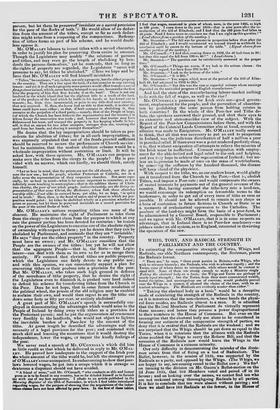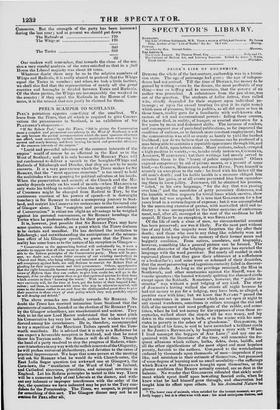WHIG, TORY, AND RADICAL STRENGTH IN PARLIAMENT AND THE COUNTRY.
IN estimating the comparative strength of Tories, Whigs, and Radicals, our able Northern contemporary, the Scotsman, places the Radicals lowest.
" There are," he says, " three great parties in Britain,—the Whigs, whn wish to advance leisurely; the Radicals, who wish to advance rapidly ; and the Tories, souse of whom desire to retrograde, while others would be content tc stand still. None of them are strong enough to make a Ministry singly Taking the electoral body as a basis, the Whigs and Tories are perhaps of nearly equal strength ; but the Tories, from thew more concentrated wealth, better discipline, and unscrupulous use of coercion, would probably prevail over the Whigs in a contest, if allowed the choice of the time, with Its at- tendant advantages. The Radicals are evidently weaker than either."
"Taking the electoral body as a basis" would be a deceptive mode of calculating the strength of the Radicals in the country, as it is notorious that the non-electors, in whose hands the physi- cal force resides, are Radicals almost to a man. It is admitted that the Radical Members of Parliament do virtually represent these masses; and hence they possess a power disproportioned to their numbers in the House of Commons. But even on the assumption that the electoral body are alone to be considered in forming our estimate of the comparative strength of parties, we deny that it is evident that the Radicals are the weakest ; and we are surprised that the Whigs should be put down as equal to the Tories, when it is notorious that the alliance with the Radicals alone enabled the Whigs to carry the Reform Bill, and that the secession of the Radicals now would leave the Whigs in the House of Commons in a ruinous minority.
Our only difficulty in demonstrating the mistake of the Scots- man arises from that of fixing on a test of Radicalism. The Ballot, however, in the session of 1835, was supported by the Radicals as a party, and opposed by the Whigs. (The Whigs, we are happy to say, are coming round to the Ballot now.) We fin' on turning to the division on Mr. GROTE'S Ballot-motion on the 2d June 1835, that 160 Members voted and paired off in its favour; and on looking over the names, we cannot find ten who are not reckoned among thoroughgoing Radicals by all parties. It is fair to conclude that ten were absent without pairing ; and then we shall have 160 Radicals at the fewest, in the House of Commons. But the strength of the party has been increasei during the last year ; and at present we should put down
The Radicat4 at 170
The Whigs.at ...
170
340 The Tories 318 22
Our readers well remember, that towards the close of the ses- sion a very careful analysis of the votes satisfied us that in a full House the Liberal majority was about 20 votes.
Whatever doubt there may be as to the relative numbers of Whigs and Radicals, it is really absurd to pretend that the Whigs equal the Tories in number ; and when.we look a little further, we shall also find that the representation of nearly all the great counties and boroughs iS divided between Tories and Radicals. Of the three parties, the Whigs are incomparably the weakest in the country : if they equal the Radicals in the House of Com- mons, it is the utmost that can justly be claimed for them.



























 Previous page
Previous page